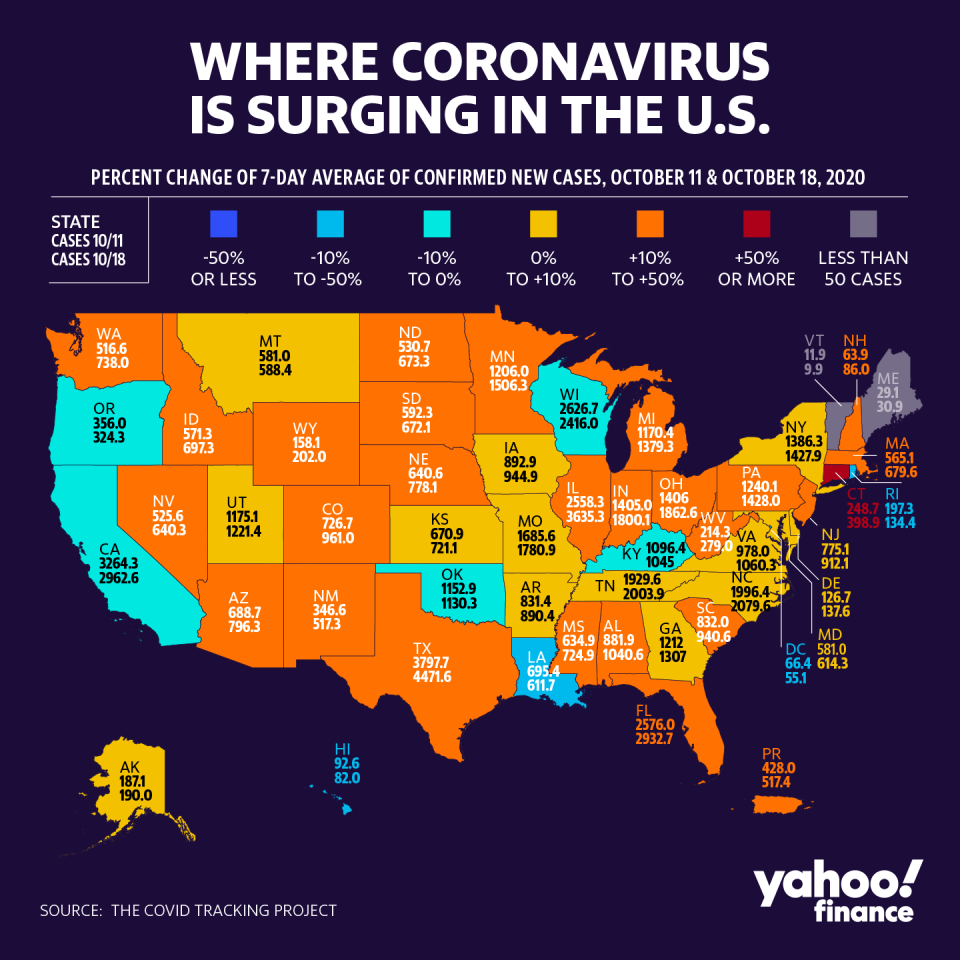Coronavirus update: Deaths on the rise as new COVID-19 wave starts to swamp US, Europe
New worldwide surges of COVID-19 infections, part of seemingly endless fresh wave of coronavirus infections, is drawing new emphasis on rising hospitalizations and rates of death.
The beleaguered U.S. hit another peak of 62,000 cases Tuesday, a number not seen since the summer wave hit the Sun Belt. The highest daily cases are being reported in states with the largest populations like Nevada, Florida and Texas, but Wisconsin and Illinois are also leading with daily positive cases.
Meanwhile, the global toll is reaching nearly 41 million reported cases and more than 1.1 million deaths; domestically, new diagnoses are near 8.3 million with more than 220,000 deaths reported.
While the rate of death in the country has slowed in the past several months, experts have noted a slight uptick in recent days.
Dr. Howard Forman, a Yale University professor and public health policy expert, said the death rate has jumped to 5,000 per week — a figure that could hit 7,000 in November.
“We have levers to control this but seem paralyzed by poor leadership to do anything about it,” Forman said, adding that consistent messaging about masking, social distancing, testing and contact tracing is lacking.
As cases rise, public officials have debated the merits of imposing new lockdowns. With countries in Europe, particularly the U.K., on the cusp of imposing new restrictions on public life, Forman said that “a lockdown represents a failure to do the above earlier and more effectively,” he said.
Dr. Jeremy Faust, and emergency room doctor at Brigham and Women’s Hospital in Boston, told Yahoo Finance the current wave is starting at a much higher point in terms of daily cases, than anticipated earlier.
“What I’d like to see, from a public health perspective, is leadership to say...if we get to a certain death rate, or if we get to a certain count rate, we’re going to do these following things,” Faust said, echoing other experts around the country.

How treatments are progressing
Yet the experience of the spring has made experts more confident in the ability for hospitals to manage patients better, even as infections mount. Even with no vaccine or treatment that has shown 100% effectiveness, medical experts have found ways to address patient needs.
At Northwell Health’s Feinstein Institutes for Medical Research in New York, a group of researchers worked on ways to predict the likelihood of a person developing a cytokine storm — where the body’s immune system attacks itself based on signs of hyper-inflammation. This has been key cause of death among the most severe coronavirus cases.
While its not 100% predictable, the doctors feel like they have found a possible treatment combination.
Dr. Negin Hajizadeh, a pulmonary and critical care physician at Northwell who worked on the study, suggested a drug called tocilizumab—branded as Actemra and produced by Roche’s (RHHBY) Genentech arm — helped contain COVID-19 mortality rates in hospitalized patients. Corticosteroids like the proven generic dexamethasone have also shown effectiveness.
However, tocilizumab suppresses the immune system, and opens up new risks of bacterial and fungal infections. Hajizadeh addressed this by pointing out there are treatments for those, but physicians should be mindful for any infections.
Hajizadeh told Yahoo Finance that the study is limited because it relies on a retrospective look at health records of patients, and was not a placebo-controlled trial. But even so, it establishes a new medical protocol for patients if certain bio-markers are found.
“Randomized controlled studies are very strictly controlled...this is a real world study, which is messy,” she said. Even so, it has value at a time when not a lot of data is out, she added.
Northwell had previously studied the effect of hydroxychloroquine as well, but has since stopped since its effectiveness was debunked in studies.
“Remdesivir is potentially helpful, the jury is still out. We know things that don’t work, like hydroxychloroquine,” Hajizadeh said.
The new study “makes me hopeful. We’re going to do much. more. We’re looking and learning so we can do better,” she said.
Meanwhile, one late-stage vaccine trial that was initially a global frontrunner, is set to resume soon, according to Reuters. AstraZeneca (AZN) whose trial remained suspended in the U.S. even after resuming in the U.K., could resume as early as this week.
The stock was under pressure late Wednesday after a report from Brazil that a participant died, but trials will continue in the country.
More from Anjalee:
Redfield: CDC 'preparing earnestly' for vaccine in November, December
India's tech giants navigate 'literally spiking' WFH demand, H1-B fears in coronavirus era
How protests spurred Corporate America into action on race, inequality
Read the latest financial and business news from Yahoo Finance
Follow Yahoo Finance on Twitter, Facebook, Instagram, Flipboard, SmartNews, LinkedIn, YouTube.

 Yahoo News
Yahoo News 
